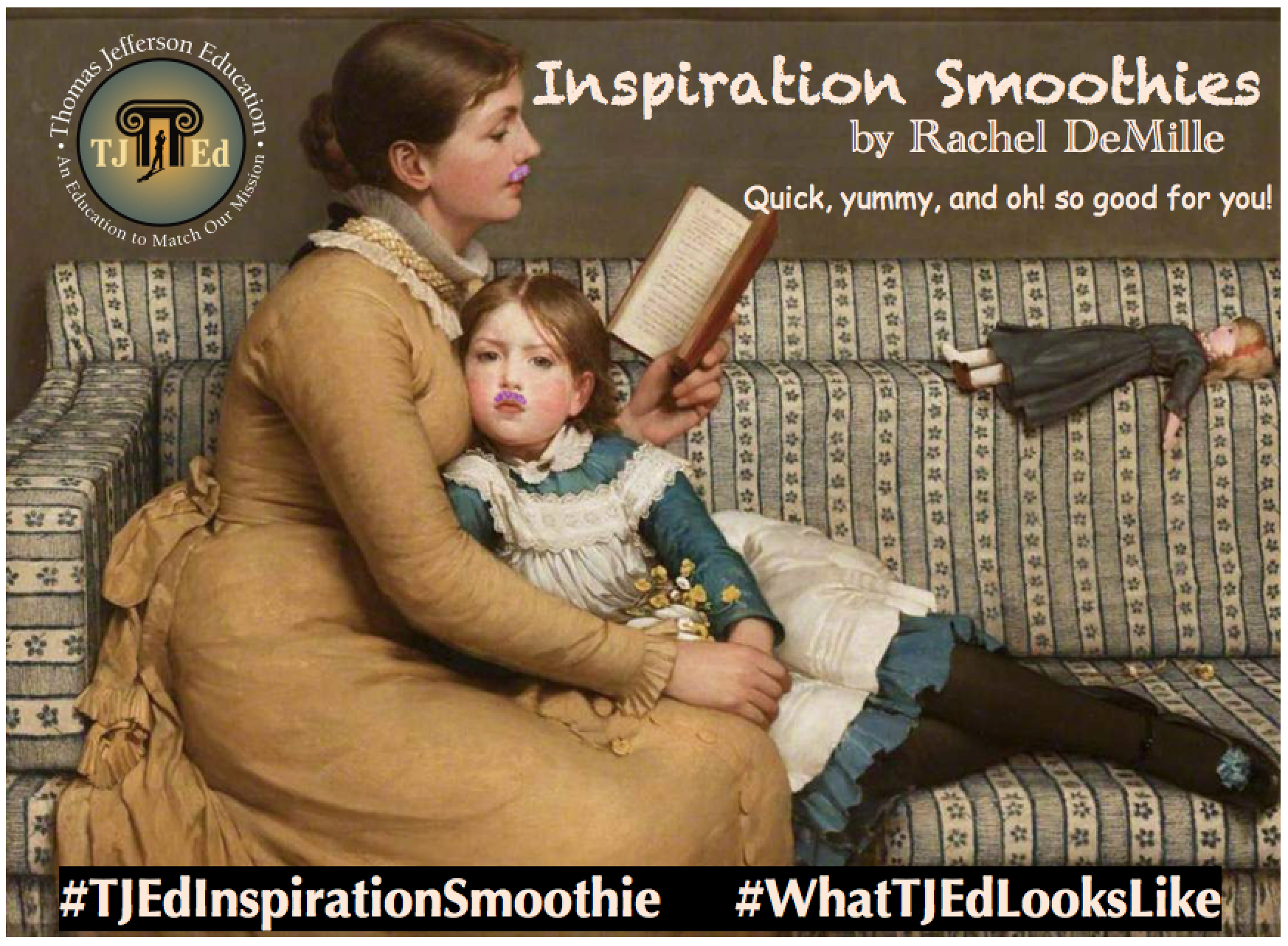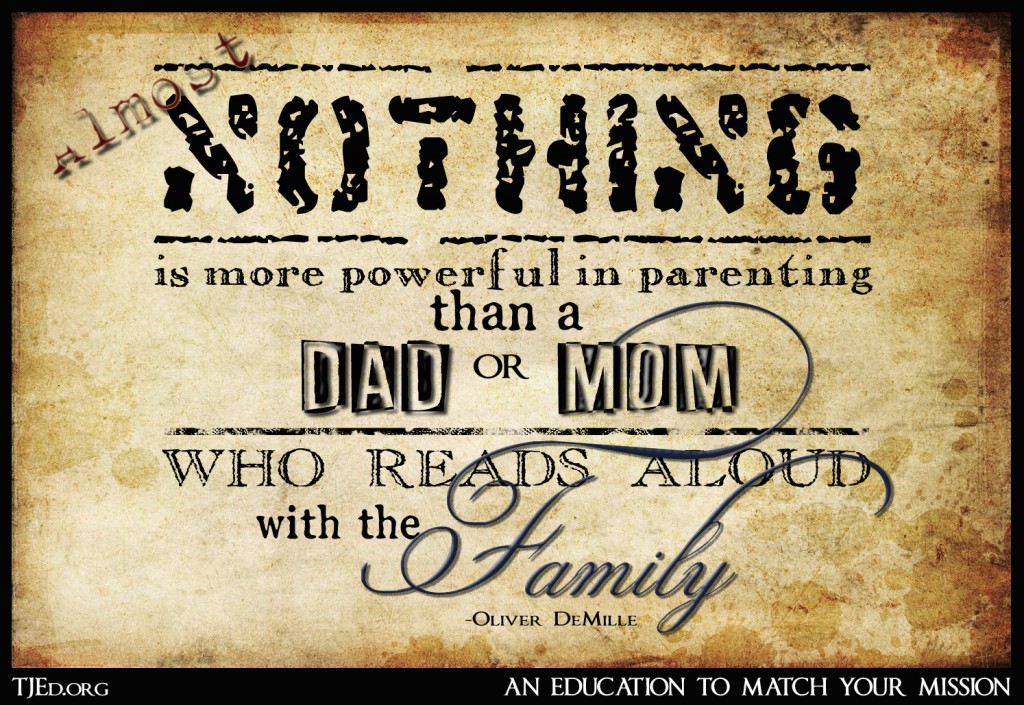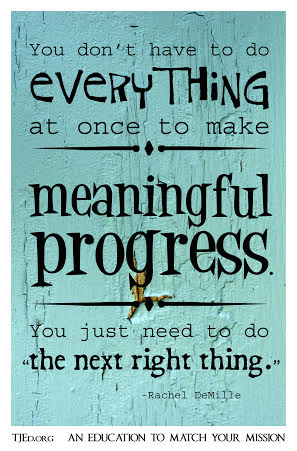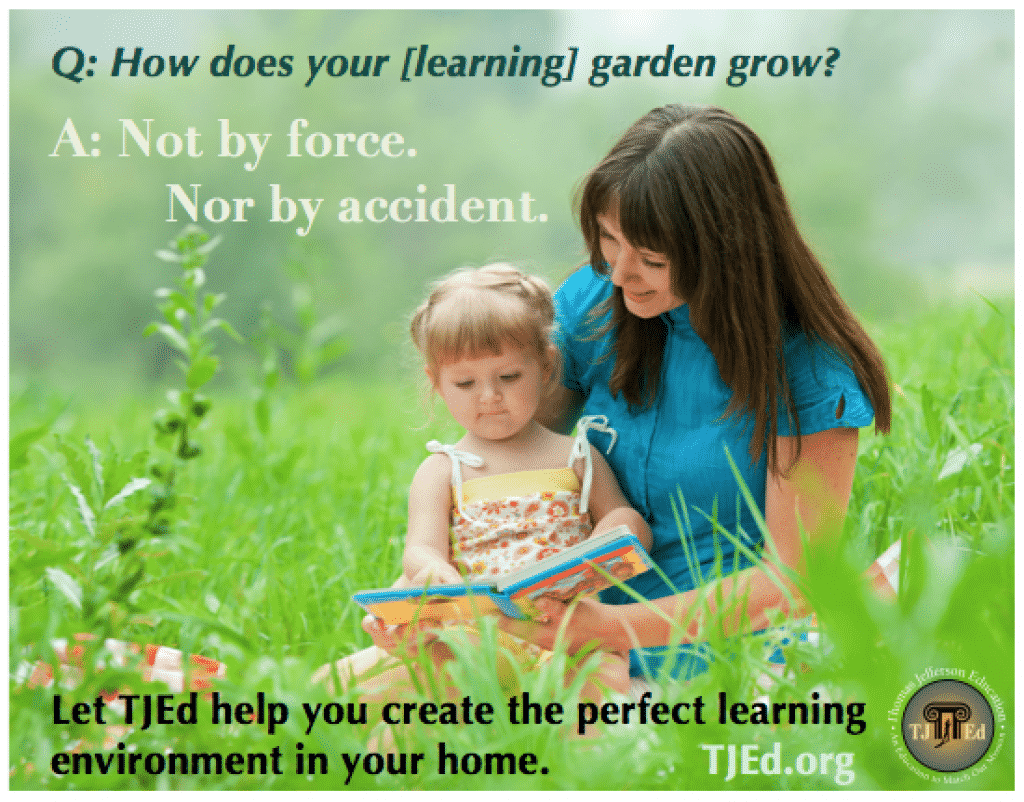
I moderate a large online forum where new and seasoned parents, homeschoolers and professional teachers discuss education and learning. Some questions are asked so frequently that I came up with what I call my “go-to advice” for those new to homeschool, or who are changing lanes and need a fresh approach….
Advice for Newbies, and Families Needing a “Reset”!
by Rachel DeMille, TJEd.org
Here’s the deal. So often, I hear, from brand-new homeschoolers:
- “What curriculum should I buy for my 13-year-old?”
- “What curriculum should I buy for my 15-year-old?”
- “My 5-year-old is holding his pencil wrong.”
- “My 17-year-old hates math.”
- “My 17-year-old hates me.”
- “My 10-year-old hates everything about learning.”
- “Should I buy the same curriculum for all subjects, or research the best one in each subject (math, literature, history, etc.)?”
And then all the other questions on what to buy, how to set up the dining room, and how long to spend on penmanship and math facts follow.
Through all of this there is a sense that the asker is in no state of mind to hear the answer, because she has an inner dialog of panic going on.
The problem is this: The asker is absolutely in earnest, but isn’t yet confident in the right questions to ask. It’s like shopping for your first car. The salesman throws around lots of details like the size of the motor, power-train-this and branded-title-that – and you might just be nodding and wishing you had a universal translator. You find yourself wondering if all of these details are important, and how to sort through what matters most.
It’s not that the questions are bad. They’re actually really good questions, but they’re out of order. It’s a little like shopping for tires when you don’t even know what rim size you want, because you still haven’t gotten the new car home.
To find your best fit with homeschool, you need to do first things first.
Once you have created an environment where the parents like homeschooling and the kids love learning, these and the other questions above are pretty easy to answer. And you don’t waste a lot of time, stress, and money buying one curriculum after another and watching all of them fail – simply because the environment undermines every effort.
In decades of personal experience with this, and after observing/mentoring thousands of families in the same process, here are 6 steps that set the stage for a happy and successful homeschool.
I would start by simplifying your home – get rid of the things that are just hanging out and bogging you down. It’s way more fun to homeschool when you’re not stressed about mess, you know?
Too often homeschoolers wonder where their day went because they’re scooting from one task to another, and never get past taking care of their home and things.
Donate it to Goodwill, recycle it, gift it, toss it. Simplify!
And not only will you benefit from simplifying your space; if you can go to the next level and simplify your time, so much the better! Make a list of the commitments that you, your kids and your family have that fill up your time, and see if you can’t create more free space in your routine. This is not emptiness. This is homeschool treasure. This is where the magic happens.
2) Family Reading.
 Do some family reading – 3 nights per week is a good target. Are your kids boys or girls? For girls, maybe start with Little House in the Big Woods, for boys, Little Britches. Either works for a mix, IMHO, and Charlotte’s Web is a good first chapter-book readaloud for younger kids. For littles: Aesop’s Fables, Kipling’s Just So Stories, Winnie the Pooh, Beatrix Potter, Little Bear, etc. Teensy kids do great with simply picture books with beautiful art. See our list of Classics for more suggestions >>
Do some family reading – 3 nights per week is a good target. Are your kids boys or girls? For girls, maybe start with Little House in the Big Woods, for boys, Little Britches. Either works for a mix, IMHO, and Charlotte’s Web is a good first chapter-book readaloud for younger kids. For littles: Aesop’s Fables, Kipling’s Just So Stories, Winnie the Pooh, Beatrix Potter, Little Bear, etc. Teensy kids do great with simply picture books with beautiful art. See our list of Classics for more suggestions >>
This shared experience with a story reaches each person’s heart and mind on their own level, while inviting a shared experience that too many families are aching for, but don’t get enough of.
3) Core Phase Fun.
 For littles, just high-quality story books, bubbles, mud, nature walks, etc., make for a great preschool. Do your household chores together – like, in the same vicinity, on the same project-type-of-together. Bake together. Sing Karaoke together (YouTube has TONS of free karaoke!).
For littles, just high-quality story books, bubbles, mud, nature walks, etc., make for a great preschool. Do your household chores together – like, in the same vicinity, on the same project-type-of-together. Bake together. Sing Karaoke together (YouTube has TONS of free karaoke!).
Teach them playground games like foursquare, hopscotch, etc. Plant an herb garden, build a bird house, fix up your bikes and go for a ride. Make some play dough and sit around the table with some fun music while you all create things. Pull out the legos or lincoln logs or magnetiles or whatever and just play and talk and do. You get the picture!
Not only do these sorts of things great tactile and cognitive experiences for the littlest ones, I can’t overstate the power of these same activities to unite the family – even with older kids! See other suggestions here >>
4) Group Activities.
 For older kids, make a trip to the library and find out from locals and city offices what museums, historical sites, art, nature, etc., is must-see in your area. Visit the city pool, cultural events, etc. This one is SOOO important! I mean, let me give you an example:
For older kids, make a trip to the library and find out from locals and city offices what museums, historical sites, art, nature, etc., is must-see in your area. Visit the city pool, cultural events, etc. This one is SOOO important! I mean, let me give you an example:
Have you ever been in a play? When you’re in a play it becomes the rhythm of your life. You eat, drink and sleep those people, those words, that whole body of work. Then, closing night is past, and all of the sudden you fall into a Showhole. Everything you were about is suddenly gone. You hated the confinements and stress of the project in a lot of ways (the last week of rehearsals is traditionally known as “Heck Week!”) – and yet, when it’s over, you feel this aimless void of purpose, and you start reliving the high points and wanting something to bring those back. You walk around quoting your lines (finding some bizarre comfort in the connection with the old routine you hated so much), feeling like you’re in a void of nothingness without the high-paced, regimented time-sucker that was your life just a few days before.
THIS is your kids’ brain, coming off of a regimented school schedule like the one you’re leaving behind. Make sense? This is why Detox is a big thing; and the longer they’re in highly structured and largely joyless model (whether this was public school, or a homeschooling format/schedule that was killing their love of learning and your relationship with them) and the more *now* looks and feels like what wasn’t working before, the harder it is to rescript your “new normal” and start fresh.
When they’re coming out of a highly structured schedule with specific expectations that they were constantly supposed to be aware of and answer to, they will tend to be a little out of practice with enjoying free time, innovating, creating, showing initiative and finding beauty, joy and curiousity in everyday things. And for homeschooling, that’s not only a drag, but it spells doom for their ability to really own their role as self-educators. You want to keep them in motion for a while so that they can cope with the change of pace, while steering clear of the types of activities that *feel* like they’re being graded, like there’s only a specific correct way to do things, etc. This will not only ease them into the mindset of learning more organically and in all times and ways, but it will do wonders to heal the family dynamic that is often disrupted by a segregated and/or regimented school format.
5) Show Restraint.
Finally, DON’T spend a lot of money yet. Get your footing. Your questions will be different a month from now; your family will be different six months from now. If you *do* buy something that doesn’t suit you, don’t try to get your money’s worth! Move on! You’ve got the prerogative to wait a time before “school officially starts”- it doesn’t have to be “formal” or official-looking to be valuable, especially at first. Ease into having a more direct hand in the intellectual life of your family. A little less TV, time off from electronics, a lot more doing stuff together, from family work to physical play.
 As you rebuild family culture, you’ll have a better sense of what you’re looking for out of the resources you might spend money on, and have totally different questions than you do right now. There’s time to figure it all out.
As you rebuild family culture, you’ll have a better sense of what you’re looking for out of the resources you might spend money on, and have totally different questions than you do right now. There’s time to figure it all out.
Most people will tell you that “detoxing” is a really valuable place to start, so even though you may have envisioned doing “school”, you may find that you’re still getting great benefit from reading to them while they do puzzles, doing projects in the kitchen, visiting local sites, etc., and not trying to duplicate “school at home.”
It really helps, when kids are recently out of public school, to stay in motion for a while, together as a group – home-based projects (cooking, building, puzzles, physical play), field trips, etc. These activities really help them to sort of come down from the rhythm they’re used to of always having their day scheduled.
And keep in mind, that even when you’re past the detox phase, great homeschooling doesn’t look the same, day-in-and-day-out. It’s purposely aligned to take advantage of the rhythm and learning in real life. Check this out to see what I mean. >>
If you want our help with a group-learning program for your family that will help you fill your days with interesting new thoughts, projects, people and ideas while you get your footing, see our award-winning This Week in History >>
6) Lead Out.
 Next thought, and this one is important: Give yourself permission to spend a little bit of time each day/week on YOUR education. The investment in yourself pays off in SOOOO many ways. 1) You set an example of self-education that pays dividends of them owning their own education. That’s less effort for you, more success for them! 2) It will give you a well to draw from. You’ll think bigger thoughts! Have more inspiring ideas that you’re excited to share! Feel taken care of because you’re filling YOUR bucket!
Next thought, and this one is important: Give yourself permission to spend a little bit of time each day/week on YOUR education. The investment in yourself pays off in SOOOO many ways. 1) You set an example of self-education that pays dividends of them owning their own education. That’s less effort for you, more success for them! 2) It will give you a well to draw from. You’ll think bigger thoughts! Have more inspiring ideas that you’re excited to share! Feel taken care of because you’re filling YOUR bucket!
Remember, an investment in your education is not a withdrawal from your kids’. It will pay dividends on a gold standard for generations to come!
TJEd is also known as “Leadership Education.” And the leader in LE is not *just* the kid that grows up in your home under these principles; it’s you! YOU lead out and show them the way. You get excited about education – not just for theirs, but for yours.
If TJEd is calling to you, I would not recommend “winging” it. Don’t just copy a friend, or browse and guess. Do your homework. Our Mentoring in the Classics/TJEd Implementation course is designed specifically to help you become a self-guided learner, design your ideal family education culture, become conversant in the language of the classics, and really *own* the principles of Leadership Education so you can be your own expert. Check it out >>
Once these 6 things are well established, you’ll start to see positive changes in things you didn’t know could change. Your 13yo will smile more. Your 10yo will be cuddly when nobody is looking. Your kids will treat each other with more affection and respect. You’ll start to relax and notice that learning is happening all the time!
These might seem like great advancements for family relations, but actually it’s even more than that. These changes you’ll notice mean that you and your kids are primed for serious learning. These things create an environment where parents love homeschooling, kids love learning, and teens love studying. In such an environment, the rest of your work will be so much easier, and you’ll be ready for new questions, more questions.
And we’re here to help!
- Here’s a great one to start with (when you’re ready…) >>
- And here’s another one >>
- (There’s lots more where that came from. Join Mentoring in the Classics!)
FINAL WORDS FOR THOSE STRUGGLING WITH CHANGE:
Hugs to all you new and/or struggling homeschoolers! I’ve been lamenting lately that lots of new homeschoolers really punish themselves, and, unwittingly, their kids, for not fitting some ideal that’s not actually ideal for them. Please don’t be so hard on yourselves!
Take a day off and go to a park, or the library, or play board games. Do something you love. Cultivate smiles and hugs. Tomorrow is another day.
Please know that pretty much all successful homeschoolers really wandered a little at first trying to find their ideal. And I don’t know any really successful homeschoolers who are super set in their ways. They’re open minded, and always asking new and different questions on how to improve.
Your family is organic, and dynamic, and your homeschool ideal will be, too. Be patient with the process! You’re not going to ruin them or break them, and there really is plenty of time to figure it out.
Don’t hurry up to follow a path that feels wrong. Slow down, stop, turn around, enjoy the moment. You’re going to be fine! ♥
♥ ♥
You don’t have to be perfect to be spectacular.
Parents and educators all over the world are making a positive difference by integrating idealistic principles into their family culture. The transition isn’t immediate, but in some important ways the results are. Within just a few days’ time a new level of hope and vision can be sensed; over time, and with the incorporation of more and more principles, confidence can be gained that hoped-for changes are on the horizon.
xoxo rd
Rachel DeMille, TJEd.org
“An Education to Match Your Mission”



































Thank you! After studying TJEd for six years, I finally took the plunge and became a NEWBIE myself in September. I have been the panic-stricken mother, and I have found my greatest peace when I study (again!) those principles you have captured so well in TJED, Phases of Learning, and your other insightful training. I am finally disciplining myself to stress less about my little students and dedicate daily time to resurrecting my learning muscles. You are so right; it fills my bucket, and then I have something to share that lights fires under my little ones. Truly, the only real education is self-education. You have helped me reclaim my focus, sanity, and vision. Thank you!
Perhaps it should be obvious to me but, I’m wondering how all of this wonderful steps work in a family with a dysfunctional marriage.
This is indeed a great impediment to the family’s happiness and well-being. My heart goes out to those who struggle under such a burden! In most cases I urge that the person who’s trying to implement an educational ideal in the context of a troubled marriage identify a hierarchy of goods. The highest ideal would be, in most people’s minds, to be able to heal the marriage relationship. This is because, for as long as that pillar of familial support and modeling is ailing, it can compete with the other goods on the list. And it should. Even ending the marriage doesn’t end the conflict; it doesn’t make it easier to implement an educational ideal when you now have the kids under court supervision and in two separate homes where they are getting two strong messages and the parental pillar continues to bring additional negativity.
I should far prefer a situation where a couple finds balance and mutual respect in their marriage while putting away the goals of alternative education, than a couple who finds their marriage and family in peril while pursuing TJEd. It may not be that this is the clear choice; but where it is, I don’t hesitate to urge that the questioner put the utmost priority on healing the marriage while doing what he or she reasonably can to address the other needs in the family. There are several books that I would recommend that can help IMMEASURABLY, in my experience (and according to the reports of others who have shared their experience in things of this nature):
My love and prayers to you and all whose hearts are despairing under a painful load to bear. I do believe, and have seen, that much improvement can be made in these situations when the principles taught in the above books are implemented. It may still not be ideal, but the difference makes a difference, and is worth it. Truly worth it.